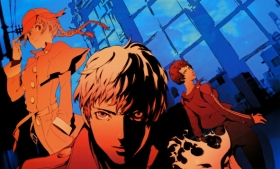
Persona 5 is a Study in Time, Adulthood and Never Growing Up
The Persona series has emerged as Japanese developer Atlus’s most popular franchise, despite being originally designed as something of a spinoff from the company’s major IP. The latest in the series, Persona 5, has shipped 2.2 million copies worldwide, and was held up as one of the best titles released on PS4 in the west last year.
For those not in the know, the Persona series usually follows a formulaic structure, as a silent protagonist tries to maintain the dual life of being a high-schooler whilst attempting to thwart great forces of evil. Gameplay strikes a balance between daily life as a student - where you will talk to classmates, study hard, play sports and generally be a teenager - and an alternative universe where the player must battle mythical monsters using their party’s godly other selves, i.e. their Personas.
Perhaps what makes Persona such a unique series is that the day-to-day school life manages to be not just interesting, but downright compelling. Persona 5, perhaps the series’ first great push into the wider gaming consciousness after the success of cult hits Persona 4 and Persona 3, finally managed to perfect it. It also manages to hammer home with great skill a set of deep, memorable themes: adults cannot be trusted, friendship conquers all, and that time is a precious commodity.

Persona 5 ages up the protagonist and his friends into their later teens, and has a more adult tone than its predecessor. This might be a reaction to the parallel aging up of the game’s core audience, which comprises of 20 and 30-somethings. What it also does, however, is draw a great big red line underneath one of the series’ key themes, better than the titles before it.
Every game in the series has featured a calendar-style mechanic, used to tell the player how long they have to complete their objectives, but also to track the days, weeks and months of the school year for the main character. Usually spanning the entire school term, it means that you’re always acutely aware of how much time you have left, and of the game’s end approaching.
In Persona 5, this end doesn’t just represent the final portions of the game, but the final portions of the main character’s school life. Come the summer he’ll be looking at college, jobs, and adulthood. This is his final year to hang out with friends, enjoy life, perhaps get a girlfriend, before the mundane world of the adults - which he has been fighting against - comes to swallow him up.

Adulthood is something to fear in Persona. Nearly every adult character in the game is duplicitous, boring, greedy, lustful or violent. You spend most of the game defeating bad-guy adults within their own minds, teaching them the error of their ways. Indeed, teenage rebellion against the status quo is a recurring motif in Japanese popular culture, and the protagonists of Persona 5 are personifications of this - the Phantom Thieves meting out justice when the real world just won’t do its job.
Every member of the team in Persona 5 is designed as an outcast, shunned by “normal” people. Katsura Hashino, studio director at Atlus, says as much: they “no longer have a place where they belong in society.” It’s something every rebellious teenager (or former rebellious teenager) can empathise with - feeling abnormal is a key part of growing up. Each hides behind a mask (another key theme in the game) from under which they approach the world. It’s a fake version of themselves they use to keep people at arm’s length. It’s no coincidence that the game’s main theme song “Beneath the Mask” is a reference to Prince Prospero at the tragic conclusion of Poe’s “Masque of the Red Death”. Poe’s story is often interpreted as an allegory of inevitability. In his case it’s death, in the case of Persona 5 it's becoming an untrustworthy, boring adult.

Breaking that chain enables many of the main cast to become their true selves - and the storylines to do with this progression are enchanting and engaging. In designing the conversations between the Phantom Thieves, Atlus has outdone itself. The text messages they send are authentic and fun. Team meetings feel genuine and important to development - here are a set of “normal abnormal” teenagers sharing feelings, tackling the world and striking out against the approach of a mundane future.
Throughout the game, I was thrown back to my years in secondary school. Though I never fought demons and shadows in my spare time, there were plenty of parallels to be found amidst the interwoven storylines and troubles of the main character and his gang. The player can feel the pressure of exam weeks, experience the joy in school holidays and revel in the defeat of a boss - not least because it means you can get back to hanging out with your friends.
By the time I completed Persona 5, much like the main characters, I didn’t want it to end. Over the 100-120 hours of gameplay I had connected with the game so deeply that I felt like it was me headed for my summer vacation, away from friends I’d made at school. Although I’m only in my late 20s, I could feel the realities of the outside world - my job, the bills, shopping for groceries - pressing in at me. For a time, while playing Persona 5, I could take off that mask of adulthood, and remember the joys of being a rebellious teenager.









COMMENTS